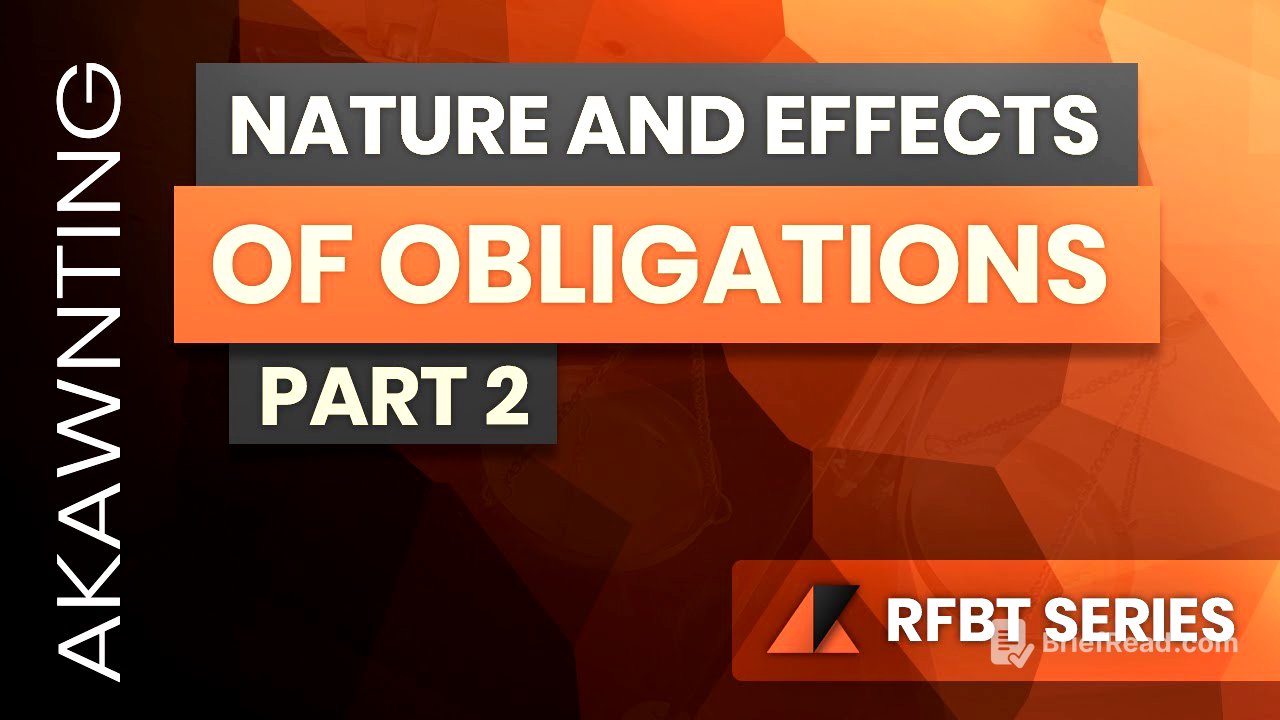TLDR;
This video explains the nature and effects of obligations under business law, focusing on fraud, negligence, delay, fortuitous events, damages, presumptions, and the transmissibility of rights. It differentiates between fraud and negligence, discusses the implications of delay in fulfilling obligations, and outlines the conditions under which a party may be exempt from liability due to a fortuitous event. Additionally, it covers the various types of damages that can be awarded in civil cases, the legal presumptions that may arise in contractual obligations, and the extent to which rights can be transferred from one party to another.
- Fraud involves deliberate intent to cause damage, while negligence is a lack of diligence.
- Delay (mora) has different implications based on whether the obligation is unilateral or reciprocal.
- Fortuitous events can excuse a party from liability unless otherwise stipulated by law or contract.
- Damages include actual, moral, nominal, temperate, exemplary, and liquidated types, each serving different purposes.
- Rights are generally transmissible unless restricted by law, stipulation, or the nature of the obligation.
Fraud vs. Negligence [1:18]
Article 1170 of the Civil Code states that those guilty of fraud, negligence, or delay in fulfilling their obligations are liable for damages. Fraud involves a deliberate intent to cause damage or injury, whereas negligence involves a lack of required diligence without deliberate intent. Liability for fraud cannot be mitigated, while liability for negligence can be mitigated depending on the circumstances. Waivers for future fraud are void, but waivers for future negligence may be valid under certain conditions. Gross negligence, which is carelessness showing reckless disregard for the safety of others, can be equivalent to fraud.
Types of Negligence and Illustrative Case [7:21]
The discussion covers three types of negligence: culpa aquiliana (negligence as a source of obligation), culpa contractual (negligence in breaching a contract), and culpa criminal (criminal negligence). Culpa aquiliana's source of liability is the negligence itself, culpa contractual arises from a breach of contract due to negligence, and culpa criminal stems from criminal negligence. Proving culpa aquiliana and culpa contractual requires a preponderance of evidence, while culpa criminal requires proof beyond a reasonable doubt. In culpa aquiliana, a pre-existing contract is not required, allowing actions from injured parties like a pedestrian. In contrast, culpa contractual requires a contractual relationship, limiting action to parties involved in the contract, such as a passenger. In the illustrative case, both the injured pedestrian and the passenger can take action against the driver for culpa aquiliana and culpa criminal, but only the passenger can pursue action for culpa contractual against the bus company due to the contractual relationship.
Delay (Mora) [16:42]
The discussion transitions to the topic of delay, distinguishing between unilateral and reciprocal obligations. In unilateral obligations, delay requires a demand from the creditor unless the law or the obligation expressly declares otherwise, time is of the essence, or demand would be useless. In reciprocal obligations, delay occurs when one party fulfills their obligation, and the other does not comply, unless there is a stipulated date for performance. Examples illustrate these rules, such as delivering a dog as a gift and selling a car with no specified time for delivery or payment.
Fortuitous Event [25:11]
A fortuitous event requires that the cause of the breach is independent of the debtor's will, the event is unforeseeable or unavoidable, it renders it impossible for the debtor to fulfill the obligation, and the debtor did not contribute to the injury to the creditor. Generally, no one is liable for fortuitous events, but there are exceptions: when the law or stipulation expressly declares, the nature of the obligation requires the assumption of risk, the obligation involves delivering a specific thing, or the debtor is already in delay. An illustrative case involves a person robbed while delivering a specific knife, which, under normal circumstances, extinguishes the obligation. However, exceptions exist, such as possessors in bad faith, those in commodatum (loan), and cases where the law or contract stipulates liability despite a fortuitous event.
Damages [36:27]
Six types of damages under the Civil Code are discussed: actual or compensatory, moral, nominal, temperate or moderate, exemplary or corrective, and liquidated. Actual or compensatory damages require proof of pecuniary loss, while the others do not. Moral damages cover physical suffering and anxiety. Nominal damages are granted to vindicate a right even without proof of actual loss. Temperate or moderate damages are awarded when pecuniary loss is certain but the amount cannot be precisely proven. Exemplary or corrective damages serve as a public example, often in criminal cases. Liquidated damages are predetermined by contract.
Presumptions [44:54]
Presumptions are rules of law that allow a court to assume a fact is true until disproven. Conclusive presumptions cannot be rebutted, while disputable presumptions can be rebutted by additional evidence. Two disputable presumptions are discussed: the receipt of the principal without reservation regarding interest implies that the interest has been paid, and the receipt of a later installment implies that prior installments have been paid. These presumptions are not applicable in all situations, such as tax payments.
Transmissibility of Rights [49:36]
The transmissibility of rights refers to the ability to transfer rights from one person to another. The general rule is that all acquired rights are transmissible unless exempted by law, stipulation, or the nature of the obligation. Examples of rights not transmissible by law include the right to vote; by stipulation, a scholarship that prohibits transfer; and by nature, the right to attend one's own wedding ceremony.









